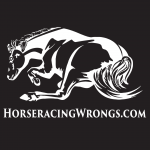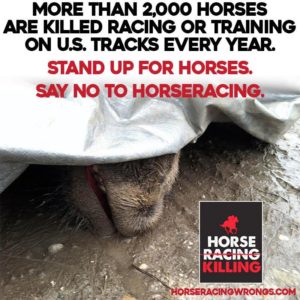As a child, I was taken once to a race track. I loved the beautiful horses. Only as an adult did I learn about the cruelty and death caused by racing horses.
 Patrick Battuello’s website horseracingwrongs.com provides a wealth of information. For example, he lists racing horse deaths by state. In 2018 there were 98 horses killed racing and training in NYS. And this number is lower than the reality because the Gaming Commission typically only discloses deaths occurring on-site (or occasionally at equine hospitals) and those within 72 hours of injury. And nothing from the many private facilities across the state. He lists all the victims by name, date and type of injury.
Patrick Battuello’s website horseracingwrongs.com provides a wealth of information. For example, he lists racing horse deaths by state. In 2018 there were 98 horses killed racing and training in NYS. And this number is lower than the reality because the Gaming Commission typically only discloses deaths occurring on-site (or occasionally at equine hospitals) and those within 72 hours of injury. And nothing from the many private facilities across the state. He lists all the victims by name, date and type of injury.
Here are just a few:
Old Dubai, Jan. 19, Belmont T “fell at the 7/8 pole, suffered fracture to front leg – euthanized on track”
Desert Affair, May 6, Belmont R “suffered a fatal musculoskeletal injury and was euthanized on the track”
The Berber, May 14, Finger Lakes T “catastrophic injury to shoulder – euthanized”
Battuello lists the wrongs of the horse racing industry
The Pounding of Unformed Bodies: The typical horse does not reach full musculoskeletal maturity till around six; the typical racehorse begins “training” at 18 months and is raced at two – or the rough equivalent of a kindergartner.
The Extreme Confinement: Most active racehorses are kept isolated in small stalls 23 hours a day, making a mockery of the industry claim that their horses are born to run, love to run. No affection, no stimulation – just an existence.
The Commodification: Most racehorses are bought and sold several times over during the course of their “careers” – traded and treated like common Amazon products.
The Drugging and Doping: Racehorses are injected with various drugs – some legal, some not – with a singular goal: to keep them running, even through pain and injury.
The Whipping: What happens openly at the track would qualify as animal cruelty if done to our pets. What’s more, in what other sport do lashes provide the motivation?
The Killing: Horseracing Wrongs estimates that upward of 2,000 horses die while racing or training on American racetracks annually.
The Slaughtering: Although the industry downplays the extent of the problem, the prevailing wisdom is that most “retired” American racehorses are bled-out and butchered in foreign abattoirs. One final profit on their heads.
National Protest to #EndHorseracing – Against The Derby Party 2019 by National Museum of Racing and Hall of Fame: Saturday, May 4, 2019 – Closest event – Saratoga
